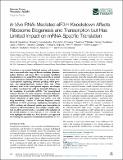In Vivo RNAi-Mediated eIF3m Knockdown Affects Ribosome Biogenesis and Transcription but Has Limited Impact on mRNA-Specific Translation
Author(s)
Smekalova, Elena M; Gerashchenko, Maxim V; O’Connor, Patrick BF; Whittaker, Charles A; Kauffman, Kevin J; Fefilova, Anna S; Zatsepin, Timofei S; Bogorad, Roman L; Baranov, Pavel V; Langer, Robert; Gladyshev, Vadim N; Anderson, Daniel G; Koteliansky, Victor; ... Show more Show less
DownloadPublished version (2.361Mb)
Publisher with Creative Commons License
Publisher with Creative Commons License
Creative Commons Attribution
Terms of use
Metadata
Show full item recordAbstract
© 2019 Translation is an essential biological process, and dysregulation is associated with a range of diseases including ribosomopathies, diabetes, and cancer. Here, we examine translation dysregulation in vivo using RNAi to knock down the m-subunit of the translation initiation factor eIF3 in the mouse liver. Transcriptome sequencing, ribosome profiling, whole proteome, and phosphoproteome analyses show that eIF3m deficiency leads to the transcriptional response and changes in cellular translation that yield few detectable differences in the translation of particular mRNAs. The transcriptional response fell into two main categories: ribosome biogenesis (increased transcription of ribosomal proteins) and cell metabolism (alterations in lipid, amino acid, nucleic acid, and drug metabolism). Analysis of ribosome biogenesis reveals inhibition of rRNA processing, highlighting decoupling of rRNA synthesis and ribosomal protein gene transcription in response to eIF3m knockdown. Interestingly, a similar reduction in eIF3m protein levels is associated with induction of the mTOR pathway in vitro but not in vivo. Overall, this work highlights the utility of a RNAi-based in vivo approach for studying the regulation of mammalian translation in vivo.
Date issued
2020Department
Koch Institute for Integrative Cancer Research at MIT; Massachusetts Institute of Technology. Department of Chemical Engineering; Harvard University--MIT Division of Health Sciences and Technology; Massachusetts Institute of Technology. Institute for Medical Engineering & ScienceJournal
Molecular Therapy – Nucleic Acids
Publisher
Elsevier BV